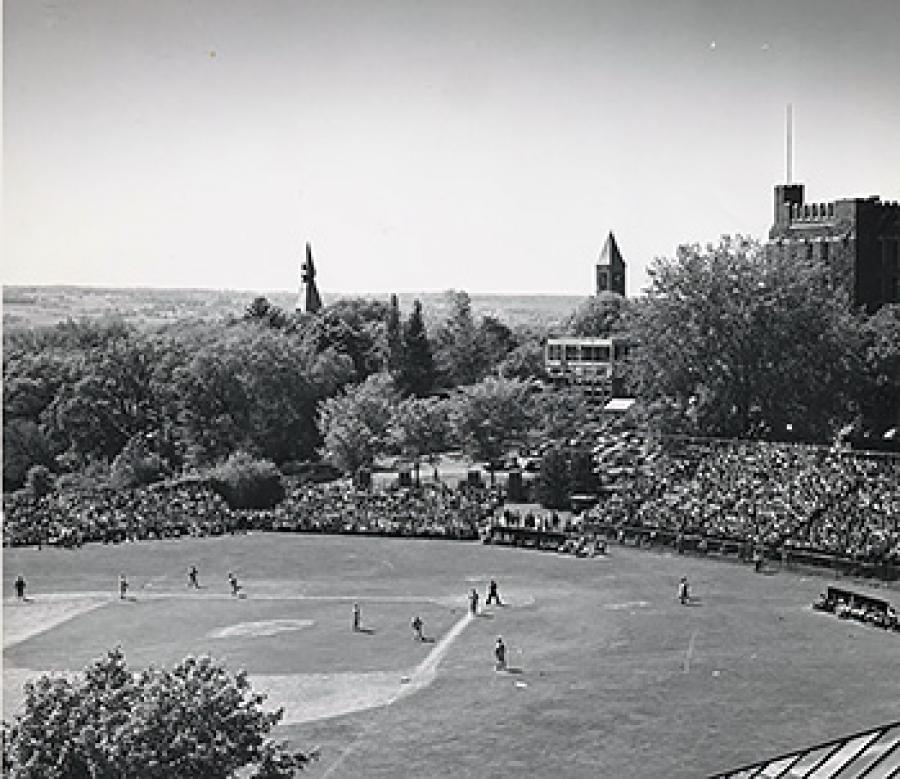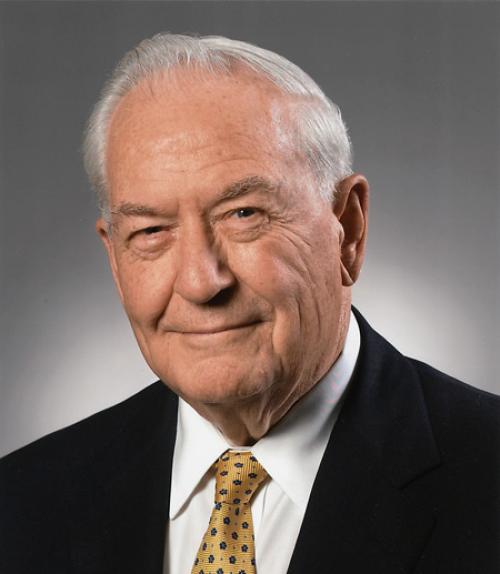Richard W. "Dick" Pogue's '50 freshman class wasn't like most classes that enter Cornell together. In 1946, 75 percent of the first-year students were veterans returning from service in World War II. Another 10 percent were women, and the other 15 percent were "greenhorn high school boys" like Pogue.
"These guys coming back from war, they were really serious about doing well in college so it was an extremely competitive environment that we entered into," says Pogue, who came fresh out of high school from Washington, D.C., on a Cornell National Scholarship. "We didn't speak the same language and they thought we were uninitiated kids, so we had to compete more vigorously.
"But it made better people out of us."
The class was so unique that a book was written about them, "Curfews, Chaos, and Champions: The Unique Story of the Cornell Class of 1950," by Brad Edmonson, as well as a documentary film, "Cornell: Class of 1950."
Today, Pogue is senior adviser at the Jones Day law firm (formerly known as Jones, Day, Reavis and Pogue); he was a partner there from 1961-94 (and managing partner from 1984-92) before returning in 2004 after a 10-year hiatus. He's committed a good portion of his time to philanthropic activities in his adopted town of Cleveland, Ohio, helping to settle the Rock and Roll Hall of Fame and Museum there and earning awards as the "Most Powerful Man in Cleveland" in 1998 and the Ohio Bar Medal, the Ohio State Bar Association's highest award, in 2015.
He's also been a strong supporter of Cornell, serving as president of the Class of 1950, a member of the Cornell University Council and the Class Council. Most recently, he supported the newest building on campus, Klarman Hall, by naming the lounge for the Department of Comparative Literature.
Hoy Field, 1949. Photo: Division of Rare and Manuscript Collections.
"Many of my formative experiences happened at Cornell," says Pogue, who majored in government, mentioning several professors who ignited his interest in political science, government and law. Other activities, including his time on the freshman basketball team, late nights as an editor at The Cornell Daily Sun and activism that helped Hoy Field remain a baseball field, helped him grow in confidence as he prepared to graduate, he says.
The university had announced plans to build a campus for the School of Industrial and Labor Relations on the site, Pogue recalls; students and alumni organized to fight the decision and "save Hoy Field." "Amazingly," he says, "we won!"
At Cornell, Pogue was sports editor at the Sun his junior year and managing editor his senior year and dreamed of becoming a sportswriter, but feeling undecided about his future, he entered law school at the University of Michigan. He eventually wrote an article on the interface between copyright and design patent law -- the article was chosen by the American Society of Composers, Authors and Publishers as the best of the year, and it was cited in a case by the U.S. Supreme Court.
Following law school, he served three years in the Patents Division of the Office of the Judge Advocate General, United States Army, in the Pentagon and left with the rank of captain. While he was at the Pentagon, he spent nights and weekends helping a professor write a book on antitrust law; his efforts brought him to the attention of a lawyer at Jones Day in Cleveland.
"Although my wife, Pat, and I had never been to Cleveland, we liked the firm immensely and found that the city was the right place to raise our family," he says.
He wanted to expand his specialization beyond antitrust, but in fact, Pogue said he spent much of his time on those cases, eventually heading the American Bar Association's Antitrust Law Section.
At the same time, his firm got to work building up the company; it expanded to Columbus, Ohio, and then to Dallas, Texas, acquiring a local firm there. It began to open international offices in 1986, with Pogue at the helm of the expansion, crisscrossing the globe. It became the first national law firm and then a global powerhouse -- growing from 330 to 1,250 lawyers from 1984-92. (It now has about 2,600 lawyers, 1,660 in the United States.)
While the firm grew, it also invested in community organizations throughout Cleveland. Pogue says one of his most fulfilling activities was as chairman of the Cleveland Foundation, the nation's first "community foundation"; it helps distribute money from estates and other gifts to a variety of nonprofit organizations.
"It was a wonderful experience because it gave me a panoramic view of the nonprofit world in Cleveland," Pogue says. Though his prime areas of interest are economic development, job creation and higher education, Pogue has also been a strong supporter of the arts and medical organizations.
"I am a great believer in higher education and I resent this modern tendency to question its value. I've worked to help people have access to at least an undergraduate education," he says, noting statistics that show that over a lifetime, people with a college degree earn many times that of those with only a high school diploma.
This story first appeared in Ezra Update.






